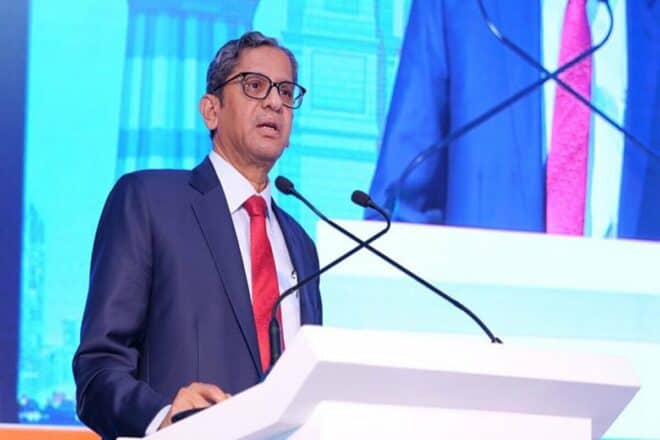The Chief Justice of India, N.V. Ramana, remarked on July 30, “Only a small percentage of the population can afford to approach the courts for justice; the majority suffer in silence.” See here.
https://twitter.com/barandbench/status/1553245870719905792
The Chief Justice illustrated India’s sad reality of social and economic disparities, which undermine the democratic goal of providing the access to justice for all.
According to the chief judge, the majority of people lack the knowledge and resources needed to access the courts.
The CJI observed during his speech that “Modern India was built around the goal of removing the disparities in society.” Project Democracy is about providing a space for the participation of all. Participation will not be possible without social emancipation. ” “Access to justice is a tool for social emancipation.” at the All India District Legal Services Authorities Meet.
Along with Justices U.U. Lalit and D.Y. Chandrachud, guests on the dais included Prime Minister Narendra Modi and Union Law Minister Kiren Rijiju.
The “need of the hour,” according to Chief Justice Ramana, is to strengthen the district judiciary. For a large portion of the population, they are their first point of contact. The experiences that the public has with the district judicial officers will largely determine how the public feels about the judiciary.
The CJI further said that, “The district judiciary is the backbone of the justice delivery system in the world’s largest democracy… You must undertake multifaceted tasks and roles. You are best placed to understand people’s problems and social issues. “Without any doubt, the district judiciary is the driving force behind the legal aid movement in India.
The judicial system and advocates ought to take proactive action in this regard to defend the rights of undertrial prisoners. “Jail visiting advocates should promptly contact the relevant authorities on behalf of defendants who are awaiting trial.” Additionally, they ought to make contact with the families of these inmates, who quite often have no idea what is going on inside the prison.
The Chief Justice of India in his speech urged the judiciary not to “camouflage or hide” its issues.
Chief Justice Ramana exhorted the judiciary by saying that “If we intend to serve the people better, we need to flag the issues which hinder our functioning.” There is no meaning in camouflaging or hiding the problems. If we don’t discuss these issues, if matters of pressing concern are not addressed, then the system will cripple. I fear, we may be unable to fulfil our constitutional mandate of social justice. I urge you, therefore, to discuss, debate, and decide! ”
He also mentioned a few issues that need immediate attention, including the infrastructure, remuneration, and service conditions.
Chief Justice Ramana praised NALSA (National Legal Services Authority) for the services it has offered since its establishment 27 years ago and noted that, “The fact that it is aimed at offering free legal aid to 70% of our population makes NALSA the largest legal aid provider in the world.”
He further observed that, “many of the objectives of NALSA have been translated to social realities and this was made possible because of the sincere effort of dedicated judges and advocates.”
The CJI also emphasised the necessity of bolstering alternative dispute resolution (ADR) systems like Lok Adalat, mediation, and arbitration facilities.
He claimed that by giving millions of people a place to settle their grievances, these ADR mechanisms have the power to completely transform the legal landscape of India.
“Matters ranging from matrimonial and intergovernmental disputes, government contracts and land acquisition can be attempted to be resolved through mandatory ADR. This will not only reduce pendency and backlog but also will provide a much-needed speedy justice to affected parties,” Chief Justice Ramana remarked.
Over 1,200 delegates from across the country are attending the two-day meeting, which is being organised by NALSA. It consists of the principal district and session judges of all judicial districts, as well as the ex-officio chairpersons of DLSAs. They are expected to talk about implementing the unified business process to effectively provide legal aid to the poor and marginalised people.













